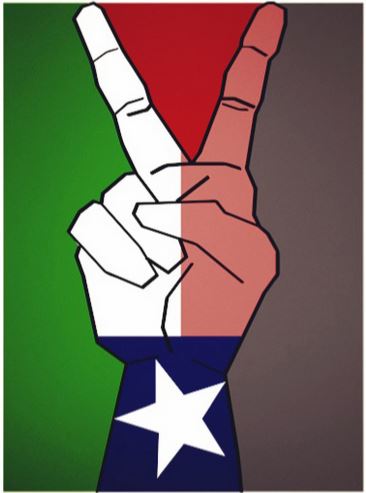A Selfish Statement.
When used in bad faith by Zionist warmongers, the phrase “Stop Singling Out Israel” is an effort to change the terms of the debate. Instead of talking about Israel and what it is doing (they argue), you should be looking at places that are much worse; Syria, for example.
It’s worth asking this question in good faith, however. As with so much right wing sophistry, there is a kernel of true insight woven into the logic: Israel and Palestine do receive a truly remarkable amount of attention in the United States, a surplus that has to be explained. We are obsessed with it, right, left, and center. Why?
Many Zionists would explain this surplus of attention by invoking the specter of anti-Semitism, but while the narrative of anti-Semitism they tend to provide is so impoverished and ahistorical as to make that answer useless, the question is a real one. “We” are singling out Israel, if the “we” in question is American non-Jews.
America stands with Israel as Israel Stands Its Ground; this is the political reality, an identification with Israel that is unshakable, unconditional, and unlimited. That’s enough of an answer right there. 100% of our politicians support Israel without significant reservation; at most, they offer constructive criticism—“maybe kill fewer kids?”—and they are always ready to help the IDF reload. The US population is, by and large, extremely supportive of Israel, though the ignorant fantasies that Americans have about what is actually happening are a large part of the problem; fantasies grow in ignorance like plants grow in dirt, but the seed is what starts it, and the seed is there. Nevertheless, where there are exceptions, we are a minority and we feel like it. Most Americans “stand with” Israel rhetorically, and all of us support them with our tax dollars, whether we like it or not. In practical terms, if you're my age, you were born "Standing with Israel."
This is the easiest answer to the question of why to “single out” Israel. We pay for an astounding amount of the military hardware that Israel is using to kill Palestinians—whether we like it or not—so it’s incumbent on us, at the very least, to speak up and decide which “us” we want to be included in. It is the very least we can do, and it isn’t very much, and it’s not going to save any lives any time soon; witnessing is not an intervention, by definition. But when this country’s entire political class closes ranks behind Israel, can you opt out of having an opinion? They are having an opinion for you. You can say yes or nothing, or you can say no: you have precisely those two choices. You can either say yes, my government represents me, or you can say no, they don’t.
Or maybe nothing is so simple as that, and easy answers are to be peered at skeptically. Identity and emotion usually explain more than budgets, but they are also much harder to talk about: whatever our reasons are, the stories we tell about Israel and Palestine are sometimes/often/always cover stories for the narratives we’re telling about ourselves.
To be as blunt as I can be, then, with the blunt instrument that the word “yes” is: in precisely the ways that hate is love gone bad, yes, I do hate Israel. I also hate the United States and Texas, precisely because I live in them, and hope to continue doing so. I don’t want to kill anyone, or hurt anyone; I hate because I want to stop. Hate is what happens when love doesn’t keep its promises, when a consuming identification becomes disgust, and we vomit out that which has suddenly become foreign. Hate is anything but rational and reasoned: it is the body’s defense mechanism against that which the brain didn’t know enough to reject.
So let me vomit it out: I hate white men, America, Israel, and Texas. I hate what my identification with these identities makes me, what it means to carry an American passport and a Texas driver’s license, and to pay taxes that buy bullets to kill brown children. These are things that I have been force-fed, and I want to vomit them in a last ditch effort not to digest them. That’s what this Texans For Gaza event, tomorrow, is. We all know that Texans don’t “Stand with Gaza” in the normal sense of those words; if ever there was a population you can generalize about, after all, it’s Texans, and we all know what Texans are and stand for, don't we? (do we?) Texans stand their ground, and those words should make us sick to our stomachs. That’s why it’s important to say other words, to try those words out on our tongues and see how they might taste. Maybe we don't know as much as we might think, and that's a good thing.
 I wish I could be there; this post is my substitute, and a purely selfish one. Instead, tomorrow I will take my American passport and my Texas drivers license, and I will fly to another country, where the fact that I’m an American white man living in Texas will be an important part of my reality as a human being. People will see many things when they look at me, but that will be one of them. And even if they don’t, I will be less charitable than they will: I will look in their eyes, and see, reflected back at me, my own fears about who I am. Between me and the other world there will be ever an unasked question: unasked by some through feelings of delicacy; by others through the difficulty of rightly framing it. All, nevertheless, will flutter round it.
I wish I could be there; this post is my substitute, and a purely selfish one. Instead, tomorrow I will take my American passport and my Texas drivers license, and I will fly to another country, where the fact that I’m an American white man living in Texas will be an important part of my reality as a human being. People will see many things when they look at me, but that will be one of them. And even if they don’t, I will be less charitable than they will: I will look in their eyes, and see, reflected back at me, my own fears about who I am. Between me and the other world there will be ever an unasked question: unasked by some through feelings of delicacy; by others through the difficulty of rightly framing it. All, nevertheless, will flutter round it.
I use W.E.B. DuBois’ words, there, because he describes double-consciousness in terms which fit the experience, one of the many places where DuBois will teach you more about being white than any white man.
A lot of people don’t realize it, but it was very important to Dubois that he chose to be black; early in his astoundingly long life, in Germany, before he wrote Souls, or even “The Conservation of Races,” DuBois dallied with the idea that race didn’t exist, that it would be better to be color blind and to hold that all humans were simply human, no more. He became a great philosopher when he outgrew that notion, when he began to think about the materiality of the race fiction: whether or not it’s true is irrelevant to the fact that it means something, and does something.
"But what is this group; and how do you differentiate it; and how can you call it 'black' when you admit it is not black?"
I recognize it quite easily and with full legal sanction: the black man is a person who must ride "Jim Crow" in Georgia.
To pretend that race does not exist is to obscure the fact that some people must “ride Jim Crow in Georgia,” and because they do, the fact that you don’t is a fact. To deny that citizenship exists, and means something, is to obscure that some people have passports that either function as apartheid travel papers or, because they don’t have travel papers, make them into illegal human beings. I have an American passport, so I can travel where I want; if I were an American Jew, I could move into a Palestinian’s house. I didn’t make that choice, but the fact that it was made for me makes the world I live in what it is. I hate “America” because I have no choice but to be an American, because I hate what other people have made me into, and because I hate the fact that I wasn’t consulted. The same is true for “White Men”: it is precisely because I am a white man that I have to concern myself with the ways that patriarchal and white supremacist violence structures the world I live in. The wages of whiteness are not a check I can leave un-cashed; we white men were long ago auto-enrolled into direct deposit.
DuBois chose to be black, because it was the choice he could make. As long as there was Jim Crow, he was black. But what he understood, and made clear over the course of his long and productive life, is that there’s agency in choosing the choice that’s been made for you, or at the very least, there’s self-knowledge. To pretend that you can choose, when you can’t, is to live a lie. To choose the only choice that’s available to you, on the other hand—to let yourself be interpellated—is the only way to come to grips with the reality of the world you live in. It is precisely because we didn’t choose to be white, or black, or American, or Jewish, or Palestinian—or whatever the world might tell us that we are—that we have the ethical responsibility to come to grips with what others have chosen for us to be. If you are white, you don’t get to pretend that Jim Crow has nothing to do with you. If you are an American, you don’t get to look away from Gaza, or to pretend that Israel has nothing to do with you. You don’t get to sit on the fence. Your elected representatives have taken that choice away from you, when they decided to speak in your name, the one small injury in this whole catastrophe that you can legitimately claim. No one else cares whether you agree with that choice, unless and only if you contradict it. You can only choose to be white--if you are me--but to do so makes other things possible.
That’s why a sentence like “Texas Stands With Gaza” has the ring of poetry in it, for me. It isn’t true—poetry never is—but goddamn it if it isn’t a sentence that feels good on the tongue, a little like stretching your legs after an intercontinental flight. It does us good to say it. Because the other words don't have to be true either; language is what it's used to say, so let's say better things. And if it doesn’t save a single man, woman, or child from the sniper bullets, tank shells, and missiles our governments provide—and we can’t dare to hope that it will—at least we will know that we have done the very least that we can do. That is a nourishing thing to know.
Update, August 3: from yesterday. These are all Texans, even if they are not all Texans.
Fox Austin: 'Texas Stands with Gaza' rally draws thousands to Capitol

